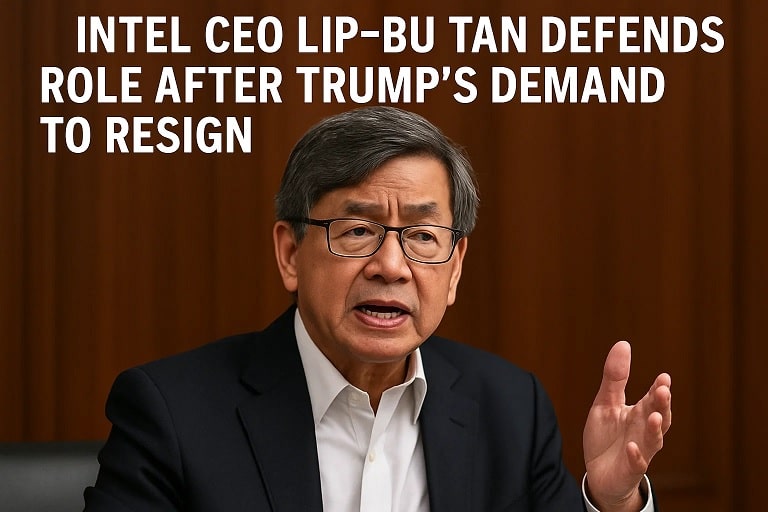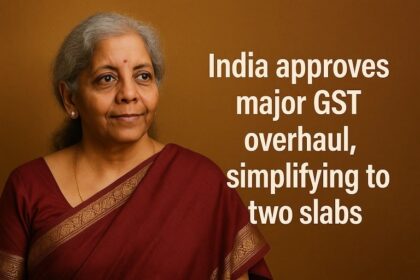Intel CEO Defends Role After Trump’s Demand to Resign
On August 7, 2025, U.S. President Donald Trump demanded the immediate resignation of Intel CEO Lip-Bu Tan, labeling him “highly CONFLICTED” in a Truth Social post, citing alleged ties to Chinese firms. The call, amplified by a letter from Senator Tom Cotton raising national security concerns, has put Intel—a key U.S. chipmaker—at the center of a geopolitical storm. Tan, who took over as CEO in March 2025, mounted a robust defense on August 8, dismissing criticisms as “misinformation” and reaffirming his commitment to U.S. national security and Intel’s turnaround. Intel’s stock dropped over 3% in premarket trading, reflecting market jitters, while the controversy intersects with Trump’s broader push for domestic chip manufacturing through a threatened 100% tariff on imports.
Background of the Controversy
Lip-Bu Tan, a Malaysian-born naturalized U.S. citizen and semiconductor industry veteran, was appointed Intel CEO in March 2025 to lead a turnaround after years of declining sales and losing ground to competitors like TSMC and Nvidia in the AI chip race. Intel, a cornerstone of U.S. chip manufacturing, secured $8 billion in CHIPS Act subsidies—the largest single grant—to boost domestic production. However, Tan’s past investments, reportedly over $200 million in hundreds of Chinese tech firms through his venture capital firm Walden International, have drawn scrutiny. A Reuters report in April 2025 highlighted that some of these firms were linked to the Chinese military, raising national security concerns.
Additionally, Tan’s tenure as CEO of Cadence Design Systems (2009-2021) has come under fire. Cadence recently pleaded guilty to illegally selling chip design tools to China’s National University of Defence Technology, a military-linked institution, prompting questions about Tan’s oversight. Senator Tom Cotton’s letter to Intel’s board chair, Frank Yeary, on August 5, 2025, demanded clarity on whether Intel vetted Tan’s background and required divestment from Chinese firms, given Intel’s role in the Secure Enclave program for defense chip supply chains.
Trump’s Truth Social post on August 7 escalated the issue: “The CEO of INTEL is highly CONFLICTED and must resign, immediately. There is no other solution to this problem. Thank you for your attention to this problem!” The demand, rare for a U.S. president targeting a private-sector executive, aligns with Trump’s broader semiconductor policy, including a 100% tariff threat on imported chips announced on August 6, aimed at bolstering U.S. manufacturing.
Tan’s Defense and Intel’s Response
In an internal memo to Intel employees on August 8, 2025, Tan rejected the allegations as “misinformation,” stating, “Over 40+ years in the industry, I’ve built relationships around the world and across our diverse ecosystem—and I have always operated within the highest legal and ethical standards.” He emphasized his commitment to U.S. national security and Intel’s transformation, noting progress toward “high-volume manufacturing using the most advanced semiconductor process technology in the country” at its new Arizona facility. Tan added that Intel is engaging with the Trump administration “to address the matters that have been raised and ensure they have the facts.”
Intel issued a statement supporting Tan, highlighting its 56-year history of U.S. manufacturing and multi-billion-dollar investments aligned with Trump’s “America First agenda.” The company said it is “deeply committed to advancing U.S. national and economic security interests” and looks forward to working with lawmakers to address concerns. Intel’s role as the largest CHIPS Act recipient and its participation in the Secure Enclave program underscore its strategic importance, making Tan’s leadership a focal point.
Key Details | Information |
|---|---|
Trump’s Demand | August 7, 2025, via Truth Social, calling Tan “highly CONFLICTED” |
Tan’s Appointment | March 2025, succeeding Pat Gelsinger |
Allegations | Investments in 200+ Chinese firms, some military-linked; Cadence export violations |
Stock Impact | 3-5% drop in premarket trading on August 7-8 |
Intel’s Response | Committed to U.S. security, engaging with administration |
CHIPS Act Funding | $8 billion for domestic manufacturing |
Strategic and Market Context
Intel’s challenges predate Tan’s tenure. Under former CEO Pat Gelsinger, the company faced declining sales and struggled to compete in the AI chip market, leading to thousands of job cuts and scaled-back manufacturing plans. Tan was tasked with a strategic reset, focusing on advanced manufacturing and potential AI acquisitions, though The Wall Street Journal reported board resistance to his fundraising efforts. Intel’s stock, already volatile, fell 3-5% after Trump’s post, reflecting investor concerns over leadership uncertainty and geopolitical risks.
Trump’s tariff threat, announced on August 6, excludes companies like TSMC and Apple that commit to U.S. manufacturing, potentially benefiting Intel’s domestic facilities. However, the controversy over Tan’s ties aligns with heightened U.S.-China tensions over chips, critical for AI and defense. Cotton, as Senate Intelligence Committee chair, warned of Chinese espionage risks in tech firms, urging the Pentagon to ban non-U.S. citizens from sensitive roles. His letter emphasized Intel’s CHIPS Act obligations, arguing that Tan’s investments “raise questions about Intel’s ability to be a responsible steward of American taxpayer dollars.”
Industry analysts have mixed views. Anshel Sag of Moor Insights & Strategy argued that Trump’s demand is inappropriate, noting Tan’s “legendary” status in semiconductors and the value of his global ties. Conversely, Patrick Moorhead suggested Trump may be leveraging the controversy to pressure Intel on unrelated issues, such as U.S. investment commitments or a potential TSMC partnership backed by the White House.
Implications and Risks
National Security: Tan’s alleged Chinese investments, though legal, fuel concerns about technology transfers to China, especially given Intel’s role in defense programs. Cotton’s call for divestment and transparency could set a precedent for stricter oversight of tech executives.
Intel’s Turnaround: A leadership change could disrupt Intel’s recovery, already strained by job cuts and competition. Tan’s expertise is seen as critical, but board disagreements over strategy add complexity.
Market Impact: The 3-5% stock drop reflects investor fears of instability. Prolonged uncertainty or tariffs could further pressure Intel’s valuation, though domestic manufacturing may benefit from Trump’s policies.
U.S.-China Rivalry: The controversy underscores chips as a battleground in U.S.-China competition, with implications for global supply chains and AI development.
Trump’s Influence: Trump’s public pressure on a private CEO, echoing past demands like those against GM’s Rick Wagoner in 2009, highlights his unconventional use of presidential power, potentially chilling corporate decision-making.
What’s Next
Tan and Intel are engaging with the Trump administration and lawmakers to clarify concerns, with Tan likely needing to disclose divestment details or face further pressure. The board may review Tan’s investments to comply with Cotton’s demands, especially given Intel’s CHIPS Act funding. Trump’s tariff policy, if implemented, could boost Intel’s U.S. operations but disrupt global chip supply chains, impacting costs for consumers. If Tan remains, his ability to execute Intel’s turnaround—potentially through AI acquisitions or manufacturing advancements—will be critical. However, sustained political scrutiny could force a leadership change, with broader implications for U.S. chip policy and Intel’s competitiveness.
Conclusion
Intel CEO Lip-Bu Tan’s defense against President Trump’s resignation demand on August 7, 2025, highlights the intersection of national security, corporate leadership, and U.S.-China tensions. Tan’s alleged Chinese investments, amplified by Senator Cotton’s concerns, have thrust Intel into a geopolitical spotlight, with its $8 billion CHIPS Act role intensifying scrutiny. Intel’s commitment to U.S. manufacturing and Tan’s industry credentials provide a strong counter-narrative, but the 3-5% stock drop and Trump’s tariff threats signal ongoing risks. As Tan engages with the administration, the outcome will shape Intel’s turnaround, U.S. chip policy, and the broader semiconductor landscape in an era of heightened global rivalry.














